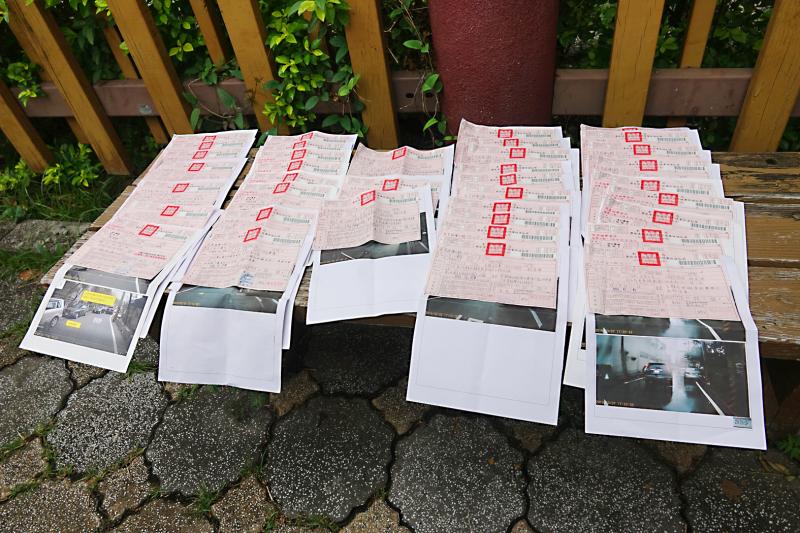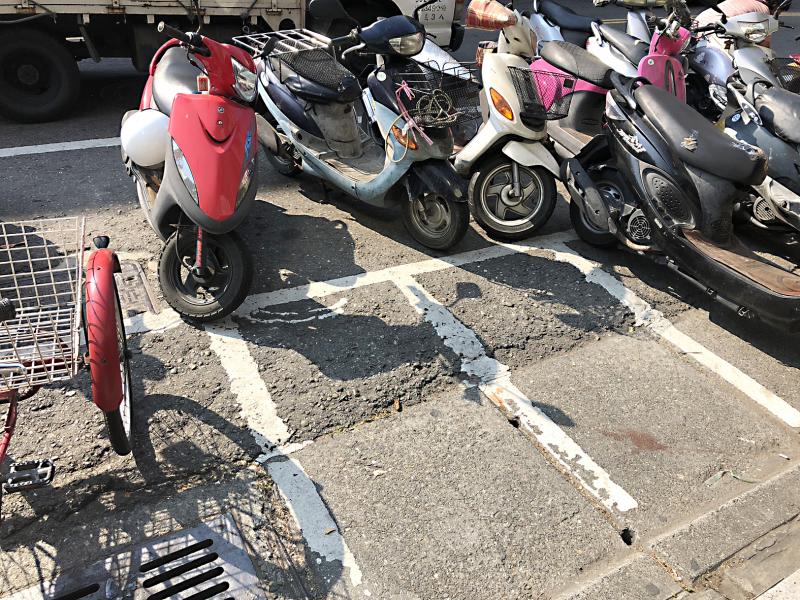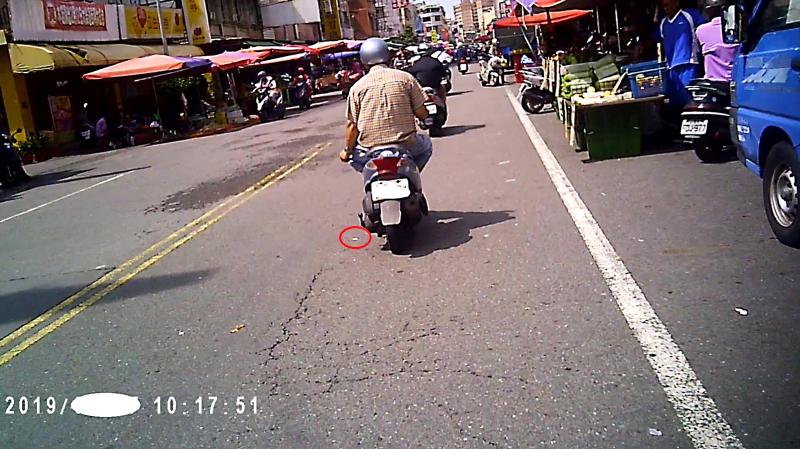When Auntie Su (蘇) was evicted from her apartment last Monday, locals were so overjoyed that they sent thank you wreaths to the Tainan Police Department.
“Justice has been served.” “Punish villains and eradicate evil,” read some of the notes. “Thank you, hardworking police for bringing peace and quiet back to Tainan!” a neighbor posted on Facebook.
Auntie Su is a notorious “informer demon” (檢舉魔人), someone who is known to excessively report violations either for reward money or — depending which side you’re on — to serve as a justice warrior or a nosy annoyance.

Photo: CNA
Usually they are called “professional” informers (檢舉達人), but Su, who would often scream at the violators and make a scene, gained such infamy that she earned her special moniker. She’s had many brushes with the law but committed no crime — she was evicted for failing to pay rent.
While Su was obviously not making much money off her exploits, some do earn a living as informers. Cash rewards are offered for mostly environmental violations such as not cleaning up after one’s dog or littering, with the bulk of the money going to informers. Last year, Taipei’s leading whistleblower reported 3,705 cases and earning NT$810,000; the top five claimed nearly 75 percent of the total budget.
But many are not in it for the dough. Last year the Taipei Police Department’s Traffic Division received over 870,000 citizen reports of traffic violations that did not pay — most of them for illegal parking. These informers say they do it because the justice system has failed to curb violations, many of which could prove deadly.

Photo: Huang Liang-chieh, Taipei Times
“The cases reported probably make up just a fraction of the actual violations. Due to the inefficiency of the public enforcement system, violators simply have no respect for the law. Professional informers are just reminding the nation of what a mess our traffic is, and urging the public to improve the current situation. What’s wrong with that?” the operator of a Facebook group dedicated to reporting traffic violations tells the Taipei Times.
BAD REPUTATION
Even though many insist that they are doing the right thing, informers generally have a bad reputation; the fact that Su’s eviction was such a big news item is telling. In October last year, a woman surnamed Lin (林) was threatened by an angry mob after she reported 91 violations in three months.

Photo: Tang Shih-min, Taipei Times
Informing on others can be risky, if not downright dangerous.
In March, a Changhua man surnamed Yeh (葉) was caught taking a photo of a suspected shady business on his first attempt at professional informing. He was dragged inside and badly beaten.
After one professional informer was doxxed last year, he began receiving threatening phone calls. On several occasions, people gathered outside his apartment to yell at him and ask him to come out and “talk.” He posted a long account on the Internet explaining how he became an informer after his brother was hit by a car making an illegal u-turn.

Photo: Chen Wen-chan, Taipei Times
“The traffic [at that intersection] has been a mess for the past 10 years,” he wrote. “No matter what the government tries to do, nothing changes. So I wanted to do something to fix this chaos.”
In a Liberty Times (the Taipei Times’ sister paper) report, an informer from Kaohsiung told the traffic police that he decided to take justice into his own hands after he was hit by a car running a red light.
“He not only wanted the violators to learn their lesson, he wanted to reduce the number of similar car accidents,” a policeman told the newspaper.
ANGERING THE PUBLIC
Informers usually draw public ire by continuously targeting certain areas and reporting minor violations. After an informer in Tainan was physically attacked by a scooter driver in February, neighbors told the media that this person was responsible for numerous tickets in the area, including an incident where a scooter barely touched the white stop line at a red light.
After being reported for illegal parking several times, a New Taipei City man last month threatened an informant.
He posted the entire video onto Facebook, which drew quite polarized comments from netizens: “They even sneak around and report people in the middle of the night! That’s unethical!” one wrote. “Why doesn’t he get a real job?” another said.
From February until the end of March, a number of businesses whose trucks were often parked on a sidewalk received hundreds of tickets. In response, the drivers began removing their license plates and installed cameras in the hope of scaring away the informer.
The reputation of informers was further tarnished in November last year when a New Taipei City man surnamed Liu (劉) was convicted of doctoring 40 videos of scooter drivers spitting on the street for the reward of NT$288 per report.
Still, some stand up for the informers, as did many after the New Taipei City man posted the video he shot online.
“If [the driver] is so afraid of being reported, he should stop breaking the law!”
BURDEN ON POLICE
Regardless of public opinion, the industriousness of “professional” informers has greatly increased the workload for the police. But despite requiring informers to provide their name in a bid to curb the practice, the number of cases has not diminished since the policy was implemented in January last year. According to Taipei Police Department data, about one out of every three traffic violations in Taipei last year was reported by citizens, with Daan and Zhongshan precincts handling over 400 cases per day.
Earlier this month, the Taipei Police Department’s traffic division told the Liberty Times that each report is a lot of work because the police have to carefully inspect each image — some of which are of poor quality or taken from an odd angle — to confirm the violation.
Both the police and politicians have been calling for a cap on the number of reported violations. Democratic Progressive Party Legislator Yeh Yi-jin (葉宜津), who supports the policy, says the police are in a bind because if they don’t handle all the violations, the public will suspect them of burying the case.
“The goal of the reporting system is not to increase the number of tickets, but to ensure traffic safety. The police cannot hide in the bushes and take pictures of violators to boost their ticket count, but the professional informers can,” she told the Liberty Times in October last year.
The operator of the Facebook group Stand Up, Professional Informers (檢舉達人讚出來) says if the government wants to review the reporting system, they should also review their laws and enforcement.
“We should do it together, and make Taiwan a better place,” he writes, half-sarcastically. “We can’t have the players and the referees on the same side.”

Google unveiled an artificial intelligence tool Wednesday that its scientists said would help unravel the mysteries of the human genome — and could one day lead to new treatments for diseases. The deep learning model AlphaGenome was hailed by outside researchers as a “breakthrough” that would let scientists study and even simulate the roots of difficult-to-treat genetic diseases. While the first complete map of the human genome in 2003 “gave us the book of life, reading it remained a challenge,” Pushmeet Kohli, vice president of research at Google DeepMind, told journalists. “We have the text,” he said, which is a sequence of

On a harsh winter afternoon last month, 2,000 protesters marched and chanted slogans such as “CCP out” and “Korea for Koreans” in Seoul’s popular Gangnam District. Participants — mostly students — wore caps printed with the Chinese characters for “exterminate communism” (滅共) and held banners reading “Heaven will destroy the Chinese Communist Party” (天滅中共). During the march, Park Jun-young, the leader of the protest organizer “Free University,” a conservative youth movement, who was on a hunger strike, collapsed after delivering a speech in sub-zero temperatures and was later hospitalized. Several protesters shaved their heads at the end of the demonstration. A

Every now and then, even hardcore hikers like to sleep in, leave the heavy gear at home and just enjoy a relaxed half-day stroll in the mountains: no cold, no steep uphills, no pressure to walk a certain distance in a day. In the winter, the mild climate and lower elevations of the forests in Taiwan’s far south offer a number of easy escapes like this. A prime example is the river above Mudan Reservoir (牡丹水庫): with shallow water, gentle current, abundant wildlife and a complete lack of tourists, this walk is accessible to nearly everyone but still feels quite remote.

In August of 1949 American journalist Darrell Berrigan toured occupied Formosa and on Aug. 13 published “Should We Grab Formosa?” in the Saturday Evening Post. Berrigan, cataloguing the numerous horrors of corruption and looting the occupying Republic of China (ROC) was inflicting on the locals, advocated outright annexation of Taiwan by the US. He contended the islanders would welcome that. Berrigan also observed that the islanders were planning another revolt, and wrote of their “island nationalism.” The US position on Taiwan was well known there, and islanders, he said, had told him of US official statements that Taiwan had not